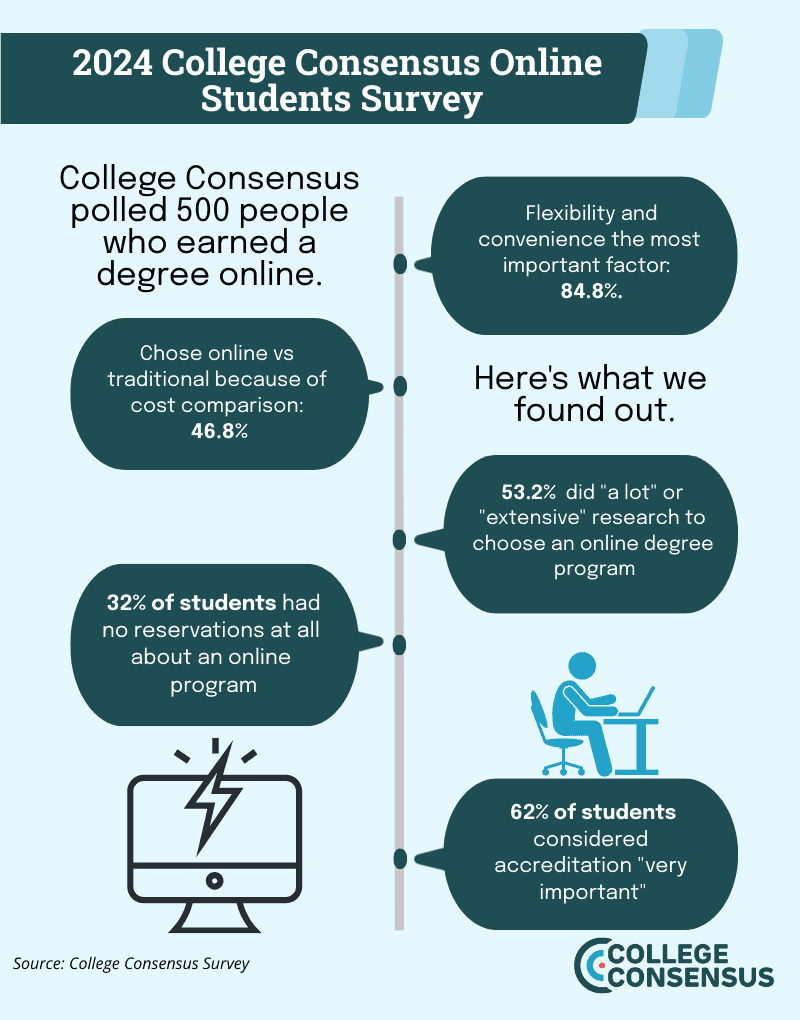Key Takeaways for Students:
- Flexibility and convenience are central
- More students than ever have experience with online education
- Fewer people are concerned about the quality of online education
- Online degrees can make an impact for minorities and working class
Since 2016, College Consensus has been here for you. From high schoolers and college freshmen to grad students and career-changing adults, College Consensus cares. We’re dedicated to the most accurate, up-to-date information to help you make decisions about your future.
In April 2024, we asked you about yourselves, and you delivered!

With Pollfish, we surveyed 500 folks who got their degrees fully or mostly online. And we learned a lot! There are some surprises, some “Well, duh” moments, and a lot of confirmation that online education has really changed the game.

What Do Students Think About Online Degrees?
First of all, one thing is obvious – flexibility, convenience, and affordability are by far the biggest reasons to get your degree online.
Online learning was growing from the beginning of 2000’s, but 2020 was really the big watershed, and you know why. Millions of people started working, learning, and socializing almost entirely online, and a lot of us never went back.
Flexibility and convenience are the reasons why.
How important is flexibility? 84.8% of you named flexibility and convenience as influencing your decision to go to school online. And 66% called it “extremely important.”
Flexibility and convenience were way ahead of the other big reasons, like:
- work/life balance – 66%
- cost savings – 37%
- preference for virtual learning – 24.4%
Even taken as separate topics, flexibility and convenience were huge:
- Flexibility – 58%
- Convenience – 31.6%

Now, when we asked whether you considered cost, you were very clear on that, too. 46.8% of you said “The cost of an online degree was a major factor in my decision.” On top of that, 23% said they compared prices before deciding on an online degree instead of a traditional on-campus program.
Cost came up as a factor again when it came to choosing which online program to take. 63.2% of you said you chose the program you chose because “It was more affordable.” The next highest answer was reputation, at 35.6%
There were some other very interesting answers to that question, by the way:
| Reason | Percentage |
|---|---|
| It had a better reputation | 35.60% |
| It offered more financial aid | 34.60% |
| It had higher rankings | 30.20% |
| I knew people who went there | 22.40% |
| It was closer to me | 21.60% |
| It offered a free laptop or iPad | 15.60% |
More than 15% chose their program for the swag! A free laptop or iPad is definitely an incentive.
But you didn’t go into an online program blindly. No way! Those of you who responded to the survey did your due diligence: 35.6% said they did “A lot” of research, and 17.6% did “extensive” research. Of course, 2.4% admitted to doing “None,” so good for you, trusting your gut and going for it!

Did you have experience with online learning? 39.2% did, but 27% had no experience at all. That’s more than a quarter! 15.4% had done a few courses, and 5.2% had taken online courses during the pandemic.
Your research led you to get an online degree, obviously. And once you really honed in, 32.4% had no concerns of reservations about getting your degree online. 26% still felt a little uneasy, specifically about issues like:
| Concern | Percentage |
|---|---|
| Lack of interaction with professors | 7.20% |
| Limited access to hands-on learning | 7.00% |
| Availability of resources and support | 6.00% |
| Cost and value of degree | 4.40% |
| Accreditation of the program | 4.00% |
| Reputation of online degree programs | 4.00% |
| Flexibility of schedule | 3.60% |
Whatever the reason, you put those worries behind you and carried on. But what did our respondents do with their degrees?
What Are Graduates Doing With Their Online Degrees?
We didn’t get into the weeds with exactly what degree everyone got, and whether that degree specifically got them a job. After all, there are thousands of majors and numerous degree types. The number of possible combinations could be astronomical.
But the demographic data from our survey revealed a lot about who is getting online degrees.
First of all, what’s your employment status?
| Employment | Percentage |
|---|---|
| Employed for Wages | 65% |
| Self-Employed | 10.4% |
| Out of Work | 5% |
| Homemaker | 3.8% |
| Full-Time Student | 3.8% |
| Retired | 3.6% |

It’s not a surprise that most people (65%) are working a normal job. That’s one of the reasons people choose an online degree – they want the flexibility to keep their job and get their degree.
And the number of self-employed people matches with the most recent census data (10.4% vs the national average of 10.1%).
But what about the others? The national unemployment rate has been hovering around 4% for a long time, and that matches up with our demographics. People want to re-train to reenter the workforce.
And what about homemakers? There’s still a big gender discrepency – 26% stay-at-home moms vs 7% stay-at-home dads. But with the internet, more and more homemakers are also pulling side hustles online, and there are more work-from-home jobs available than ever.
Retirees are also going back to work in record numbers – one in every eight, according to the Wall Street Journal. So what are they doing? They’re getting an online degree. Retirees might also go back to school for fun, to stave off boredom, or even just to keep their mind active. Staying engaged is one of the best ways to hold off dementia and cognitive decline.
We also learned a lot about the fields you’re working in.
| Field | Percentage |
|---|---|
| Finance/Insurance | 10.2% |
| Construction | 9.8% |
| Education | 7% |
| Information Services and Data | 6% |
| Healthcare | 5.2% |
| Software | 4.2% |
I don’t know about you, but this is totally in line with what we know about online education.
Think about it – what are the best degrees to get online?
All of those career fields are perfect for online education. They don’t require a lot of hands-on labs, they work great for self-pacing, and they attract self-motivated people. And of course, a lot of educators are looking for alternative careers for teachers.
And construction and healthcare? Both fast-growing sectors where you can start with just a high school diploma, but make a lot more money by getting a higher degree. Great at construction? Move into construction management. Got your RN license? It’s easy to go online to get your BSN, MS in Nursing, or even Doctor of Nursing Practice and move into higher-paying roles.
This is stuff College Consensus has been telling you for years. Nice to see it backed up with cold, hard numbers!
Who is Getting a Degree Online?
Our survey asked about your current education level, and what we found was that people getting their degrees online are an educated bunch:
- Some college – 28.60%
- Associate’s degree – 17.00%
- Bachelor’s degree – 22.00%
- Master’s degree – 26.80%
- Doctoral degree – 5.60%

Obviously, people are getting a variety of degree levels online. In the last few years, lots of students are choosing to get their associate degree at a community college, and use an online bachelor’s completion program to finish out.
One of the best surprises is how many respondents have a doctorate.
Obviously, nobody’s getting their MD online (at least no doctor I’d want to go to), but online education has made it possible to earn doctoral degrees in all kinds of areas. For instance, teachers who want to go into administration can easily earn their EdD in just a year or two while still working. Social workers can get an online MSW, and online Master of Public Health programs have basically become the standard for public health professionals.
With our poll, we were surprised to see 54.6% male, 45.4% female. Nationally, women make up 56% of college students.
While 70.6% of respondents were white, that tracks nationally – 75.5% of Americans identify as white. Other racial demographics looked like this:
| Race | Percentage |
|---|---|
| White | 70.6% |
| Black | 13.8% |
| Asian | 4.4% |
| Hispanic/Latino | 6% |

Except for Hispanic/Latino, the numbers roughly correspond to the US population. But Hispanic and Latino Americans make up 19% of the national population. That tells us that, at least in our survey, online colleges still have more work to do attracting Hispanic and Latino students.
For minorities in America, college still plays a major role in social mobility. Black college students, Asian/Pacific Islander students, and undocumented students still face a lot of unjust barriers. Online education can actually be a great way for colleges to reach these students. So can scholarships:
- Biggest Scholarships for First in Family Students
- Biggest Scholarships for Hispanic and Latinx Students
- Biggest Scholarships for Black and African-American Students
Online students aren’t all struggling or low-income, either. Just take a look at the income demographics:
| Income Level | Percentage |
|---|---|
| Under $25,000 | 13.40% |
| Between $25,000 and $49,999 | 19.20% |
| Between $50,000 and $74,999 | 18.20% |
| Between $75,000 and $99,999 | 10.80% |
| Between $100,000 and $124,999 | 7.00% |
| Between $125,000 and $149,999 | 8.40% |
| $150,000 or more | 17.40% |
| Prefer not to say | 5.60% |

When only 18% of Americans make over $100k, it’s very interesting to see such high incomes. Those master’s and doctoral degrees make a difference.
What Does All This Tell Us About Online Degrees?
So what did we learn about online higher education from our survey?
Flexibility Reigns Supreme: Convenience and the ability to learn on your own schedule are the clear winners.
Cost Matters, But It’s Not Everything: Affordability is a big consideration, but cost isn’t the sole deciding factor. Factors like program reputation (35.6%) and financial aid options (34.6%) matter.
Experience Varies, Concerns Exist: While some had previous online learning experience, others were entirely new to it. Concerns about limited interaction and hands-on learning didn’t deter most students.
Diverse Degrees, Diverse Goals: From new high school graduates to retirees, online education caters to a wide range of demographics. Fields like finance, education, and technology see strong representation among online learners.
A More Inclusive Future: While our survey showed a gender gap, and a need for greater outreach to Hispanic and Latino students, the online education landscape is evolving.
Online education is no longer an alternative; it’s a mainstream choice. As America’s economy and labor force changes with AI and other technologies, online degrees will play an even greater role in shaping the future of education.


